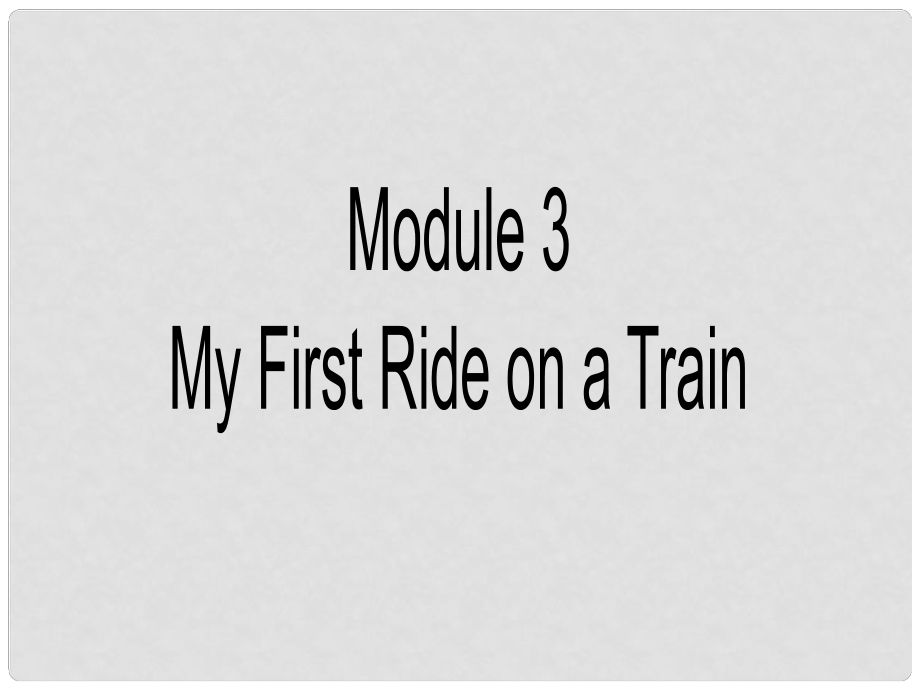《高中英語(yǔ) Module 3 My First Rice on a Train Grammar課件1 外研版必修1》由會(huì)員分享���,可在線閱讀�����,更多相關(guān)《高中英語(yǔ) Module 3 My First Rice on a Train Grammar課件1 外研版必修1(29頁(yè)珍藏版)》請(qǐng)?jiān)谘b配圖網(wǎng)上搜索����。
1���、THE ED FORM USED AS ATTRIBUTIVES-ed分詞既可以作前置定語(yǔ)分詞既可以作前置定語(yǔ),也可以作后也可以作后置定語(yǔ)��。置定語(yǔ)�。1. 單個(gè)的過(guò)去分詞作定語(yǔ)單個(gè)的過(guò)去分詞作定語(yǔ)1) 作前置定語(yǔ):這時(shí)過(guò)去分詞的形容作前置定語(yǔ):這時(shí)過(guò)去分詞的形容詞意義強(qiáng)于動(dòng)詞意義。詞意義強(qiáng)于動(dòng)詞意義�����。 Grammar Ia. 及物動(dòng)詞的過(guò)去分詞具有被動(dòng)和完成及物動(dòng)詞的過(guò)去分詞具有被動(dòng)和完成意義��。意義���。 如如: a broken cup 一個(gè)破杯子一個(gè)破杯子a wounded soldier一名傷員一名傷員b. 不及物動(dòng)詞的具有主動(dòng)和完成意義����。不及物動(dòng)詞的具有主動(dòng)和完成意義��。a grown wom
2��、an一位成年婦女一位成年婦女a(chǎn)n escaped prisoner一名逃犯一名逃犯2) 作后置定語(yǔ)��,通常是及物動(dòng)詞的作后置定語(yǔ)����,通常是及物動(dòng)詞的過(guò)去分詞,這時(shí)過(guò)去分詞意義強(qiáng)過(guò)去分詞����,這時(shí)過(guò)去分詞意義強(qiáng)于形容詞意義。個(gè)別單個(gè)的過(guò)去于形容詞意義�����。個(gè)別單個(gè)的過(guò)去分詞作前置定語(yǔ)或后置定語(yǔ)時(shí)分詞作前置定語(yǔ)或后置定語(yǔ)時(shí),表表達(dá)的含義不同�����。如:達(dá)的含義不同����。如:前置定語(yǔ)前置定語(yǔ)后置定語(yǔ)后置定語(yǔ)a concerned look關(guān)切的神色關(guān)切的神色the authorities concerned有關(guān)當(dāng)局有關(guān)當(dāng)局a wanted person 被通緝的人被通緝的人jobs wanted需要的工作需要的工作in
3、a given condition 在一定條件下在一定條件下a present given by the student 學(xué)生送的禮物學(xué)生送的禮物a used car一輛舊車一輛舊車a car used一輛用過(guò)的車一輛用過(guò)的車 2. 過(guò)去分詞短語(yǔ)作定語(yǔ)通常后置�����,其作過(guò)去分詞短語(yǔ)作定語(yǔ)通常后置����,其作用相當(dāng)于定語(yǔ)從句。用相當(dāng)于定語(yǔ)從句����。如如: the color TV set produced last year =the color TV set that were produced last year 去年生產(chǎn)的彩色電視機(jī)去年生產(chǎn)的彩色電視機(jī) a letter written to me by
4����、 my daughter =a letter that was written to me by my daughter 一封我女兒寫給我的信一封我女兒寫給我的信3. 要注意過(guò)去分詞做定語(yǔ)時(shí)動(dòng)作發(fā)生要注意過(guò)去分詞做定語(yǔ)時(shí)動(dòng)作發(fā)生的時(shí)間:的時(shí)間:1) 發(fā)生在謂語(yǔ)動(dòng)詞的動(dòng)作之前���。如:發(fā)生在謂語(yǔ)動(dòng)詞的動(dòng)作之前��。如: Is this the book written (that was written) by Henry James? 這是亨利這是亨利詹姆斯寫的書嗎詹姆斯寫的書嗎? 2) 表示與句中謂語(yǔ)動(dòng)詞相應(yīng)的經(jīng)常性的表示與句中謂語(yǔ)動(dòng)詞相應(yīng)的經(jīng)常性的動(dòng)作�����。如:動(dòng)作�。如: He was then a
5�、professor respected (that was respected) by all the teachers and students of the college. 當(dāng)時(shí)他是一個(gè)受這所大學(xué)里全體師生當(dāng)時(shí)他是一個(gè)受這所大學(xué)里全體師生尊敬的教授。尊敬的教授�����。語(yǔ)法練習(xí)語(yǔ)法練習(xí)(一一)1. Dont use words, expressions or phrases _ only to people with specific knowledge. A. being known B. having been known C. to be known D. known2. Reading
6��、is an experience quite different from watching TV; there are pictures _ in your mind instead of before your eyes. A. to form B. form C. formed D. having formed3. there was an _ look on his face when the actress appeared. A. excited B. excitement C. exciting D. excitedly4. Its wrong for the _ countri
7����、es to control the world. A. development B. developing C. developed D. develop5. I have collected the money _. A. needing B. need C. to need D. needed6. The bridge _ next year will be very long. A. being built B. to be built C. built D. building7. The book can be used in _ countries. A. English-speak
8�、ing B. English-spoken C. speaking-English D. spoken-English8. From his _ voice, I have to say that you are really_. A. disappointed; disappointed B. disappointing; disappointing C. disappointed; disappointing D. disappointing; disappointed9. This is the problem_ at the meeting yesterday. A. being di
9�、scussed; B. having discussed C. to be discussed D. discussed10. The _ look on his face suggested that he had not expected so. A. surprised B. surprising C. excited D. excitingPAST TENSE TIME EXPRESSIONS1. 常用的表示過(guò)去的時(shí)間狀語(yǔ)有常用的表示過(guò)去的時(shí)間狀語(yǔ)有:recently, during the day, one night, a long time ago, until the 1920
10��、s, in 1925, for many years, just now, at that time, during his middle school years, then, last night/year/week /month, a week /month/ year ago , in the old days Grammar II:2. 表示過(guò)去的習(xí)慣性��、重復(fù)性的動(dòng)作表示過(guò)去的習(xí)慣性��、重復(fù)性的動(dòng)作,常常用一定的時(shí)間狀語(yǔ)或頻度狀語(yǔ)用一定的時(shí)間狀語(yǔ)或頻度狀語(yǔ), 如:如: I played football every week when I was young. I used to go
11�、 shopping during weekdays. Last week we learned Module 2. Up to now, we have learned nine modules. The present perfect tenseThe present perfect tense Form: have/ has + p.p.(動(dòng)詞的過(guò)去分詞動(dòng)詞的過(guò)去分詞)Definition: 表示過(guò)去發(fā)生的動(dòng)作對(duì)現(xiàn)在造表示過(guò)去發(fā)生的動(dòng)作對(duì)現(xiàn)在造成的影響或結(jié)果:還可以表示動(dòng)作過(guò)去已經(jīng)成的影響或結(jié)果:還可以表示動(dòng)作過(guò)去已經(jīng)開始,持續(xù)到現(xiàn)在(可能還會(huì)繼續(xù)進(jìn)行下去)開始�����,持續(xù)到現(xiàn)在(可能還會(huì)繼續(xù)進(jìn)
12�、行下去)的動(dòng)作或狀態(tài)。的動(dòng)作或狀態(tài)���。表示過(guò)去發(fā)生或已經(jīng)完成的動(dòng)作對(duì)現(xiàn)在表示過(guò)去發(fā)生或已經(jīng)完成的動(dòng)作對(duì)現(xiàn)在造成的影響或結(jié)果����。常與造成的影響或結(jié)果����。常與just, recently, so far, up to now, till now, in the past, ever, never等詞連用等詞連用��。表示過(guò)去已經(jīng)開始���、持續(xù)到現(xiàn)在并且還表示過(guò)去已經(jīng)開始、持續(xù)到現(xiàn)在并且還有可能繼續(xù)持續(xù)下去的動(dòng)作或狀態(tài)�����。常有可能繼續(xù)持續(xù)下去的動(dòng)作或狀態(tài)�。常與表示一段時(shí)間的狀語(yǔ)連用,如與表示一段時(shí)間的狀語(yǔ)連用����,如: for, since, these days, this year, now等。等�。用在用在“It
13、is the first/ second/ third time + that從句從句”中中Usages:Usages:READ THESE EXTRACTS AND ANSWER THE QUESTIONS.1. After they had become stars in their own country, the Beatles toured the United States.2. Before they visited India, they had recorded seven albums.A. Which came first becoming stars in their
14��、own country, or touring the United States?A. Which came first becoming stars in their own country, or touring the United States?B. Which came first visiting India or recording seven albums?B. Which came first visiting India or recording seven albums?C. What tense do we use to show that a past event
15��、happened before another one?nowpast(future)過(guò)去的過(guò)去過(guò)去的過(guò)去現(xiàn)在完成時(shí)可用于現(xiàn)在完成時(shí)可用于“It is the first/ second/ third time + that從句從句”中中It is the second time that I have been to Beijing.It was the second time that I _ (be) to Beijing.had beenFind the following time expressions that appear in “My First Ride on a Trai
16��、n.”Recently A ling time ago During the day A hundred and fifty years agoOne night Until the 1920sAt (about) midnight In 1925Which of them can refer to past or present actions?Use similar time expressions to complete these sentences.1. People first started traveling by train _.2. _, there was a huge
17�����、railway station in the middle of the city, but it isnt there any more.in 1925A hundred a fifty year ago語(yǔ)法練習(xí)語(yǔ)法練習(xí)(二二)將下列句子譯成英語(yǔ)將下列句子譯成英語(yǔ):1. 上周末上周末,簡(jiǎn)吃了一頓由外婆做的好飯。簡(jiǎn)吃了一頓由外婆做的好飯�����。Last weekend, Jane ate a nice meal (which was) cooked by her grandmother. 2. 昨天晚上昨天晚上,她完成作業(yè)后就上床睡覺(jué)了����。她完成作業(yè)后就上床睡覺(jué)了���。She went to bed after she finished her homework last night.3. 前幾天前幾天, Robert 去北京出差了����。去北京出差了���。 Robert went to Beijing on business the other day. 4. 瑪麗過(guò)去一周來(lái)拜訪我一次?�,旣愡^(guò)去一周來(lái)拜訪我一次��。 Mary used to pay a visit to /visit me once a week.
 高中英語(yǔ) Module 3 My First Rice on a Train Grammar課件1 外研版必修1
高中英語(yǔ) Module 3 My First Rice on a Train Grammar課件1 外研版必修1

